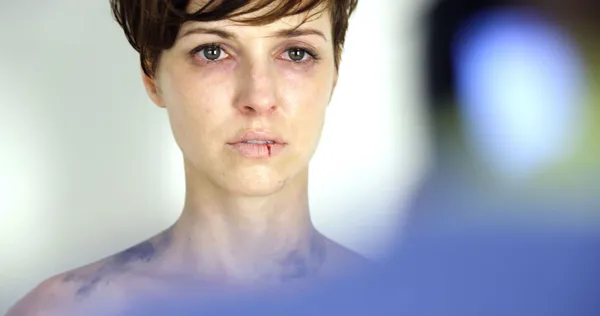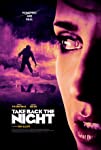Eye For Film >> Movies >> Take Back The Night (2021) Film Review
Take Back The Night
Reviewed by: Jennie Kermode

There’s a long tradition in cinema – in horror, in science fiction and in thrillers more generally – of women or children witnessing shocking incidents but finding themselves disbelieved by everyone around them. As former law student turned director Gia Elliot became all too aware, it reflects a real life tradition of women and children being disbelieved when reporting actual assaults. named for the long established feminist rallying cry which rejects the notion that women’s behaviour should be restricted because society isn’t willing to make a serious investment in dealing with predators, Take Back The Night combines these two ideas, looking at what happens when a young woman is assaulted by a supernatural monster and treated like a liar.
That woman is Jane, played by Emma Fitzpatrick, whose grounded, three dimensional performance holds the whole enterprise together. Not everybody will relate to her straight away but almost everyone will recognise her and be reminded on some level of themselves, a friend or a loved one. She’s not unusually strong or brave or determined, just an ordinary young woman trying to make her way in the world. Fortune seems to have smiled on her when she gets the first proper chance to exhibit her art, so naturally it’s a night for celebration. She has no idea what’s about to happen.
Viewers do. Even if they go into the film uninformed, audio from a police interrogation played at the start wiill make the situation clear. This means that when watching Jane having a good time, it’s impossible not to be thinking about how it will be used against her later. The drinking, the popping of pills, the impulsive sexual encounter with a guy in the bathroom who turns out to be married to one of her guests – all commonplace behaviours which are nonetheless easily demonised. She’s not completely wasted. When a friend gets sick, she steps in to clean her up and get her to her ride. It’s then that a door closes on her and she finds herself trapped in an alley. Alert to possible danger, she walks down the middle of it, doing everything as sensibly as she can. When the attack happens, she manages to get away and goes straight to hospital, where she speaks to a police officer. Shaken as she is, she doesn’t try to describe her attacker. The interview seems to go well, but this is only the start.
It’s only the start of her physical peril, too. She pulls herself together quickly and tries to get back to a normal life, despite her sister (Angela Gulner) worrying about her – but her calm façade is shattered when she catches sight of her attacker again and realises that she’s being stalked. Meanwhile, her interactions with the police take a disturbing turn. She’s asked if she inflicted her wounds herself and there’s a suggestion that she could be prosecuted for making a false report. The notion that she lives in a society where people will protect her falls apart.
Elliot’s film is angry and doesn’t try to hide it, but the message doesn’t get in the way of what develops into a strong psychological thriller. Fairy tale motifs are quiescent in the background – a red hooded jacket, an assailant covered in dark fur who will later try to break down a door – yet serve as a reminder that women have been talking about this issue for centuries. It’s brought up to date by pointed references to the present day state of affairs, such as the massive backlog of untested rape kits in the US, each the result of a woman adding to her trauma in an effort to do the right thing. Other elements are timeless: Jane’s ugly wounds may stem from an altered context but remind viewers that rape frequently results in serious physical as welll as psychological injury.
Of particular note here is the sound design, which is used to convey the trauma of the assault itself (keeping the focus on Jane’s experience and avoiding objectification), with a grating motif which returns at intervals throughout the film. Uncertainty as to whether it conveys echoing trauma or the return of the attacker adds to the tension and contributes to moments in which viewers, like the police, might begin to question the reality of what’s happening. The film’s darkest moments come when Jane begins to question herself. What happens afterwards shifts the film into more conventional territory, but shies away from suggesting any easy solution. Individual responses to a large scale problem are bound to be limited in their efficacy. It’s really the struggle for belief, and for respect, on which the narrative hinges.
Made on a very small budget and a testament to the determination of its director and star, who felt compelled to tell this story even when they didn’t know if anyone else would engage with it, Take Back The Night is a bold piece of work which will satisfy genre fans whilst reaching out to a much wider audience. It’s a film which will stay with you.
Reviewed on: 10 Oct 2022

















